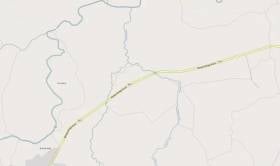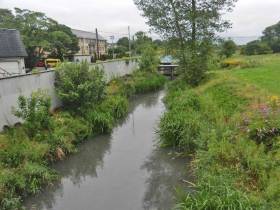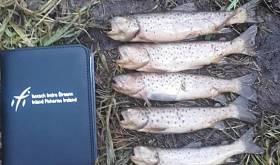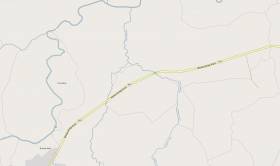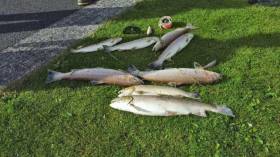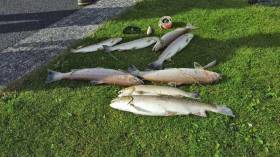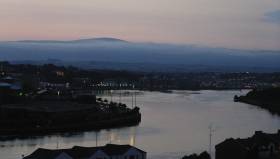Displaying items by tag: fish kill
Biogas Firm Fined Over Moyola Fish Kill
#FishKill - A bio-renewables plant has been fined £1,600 over a fish kill in an important salmon and trout angling catchment in Co Derry over a year ago, according to BBC News.
J&A Renewables was found to have allowed a slurry discharge into the Altagoan River, a tributary of the Moyola River, causing the death of a “significant” number of fish over a two-mile stretch in November 2016, as previously reported on Afloat.ie.
The company, which uses slurry and silage to make biogas for power generation, was also found to be operating its anaerobic digester without a proper waste management licence.
A fine of £1,600 plus compensation costs of £1,800 was handed down by Magherafelt Magistrates Court.
Rise In Fish Kills Recorded In EPA Water Quality Report Disappointing Says Fisheries Agency
#FishKill - Inland Fisheries Ireland (IFI) has expressed disappointment at the findings of the Environmental Protection Agency (EPA)’s water quality review.
According to the EPA report, published yesterday (Thursday 31 August), the total number of reported fish kills in 2013–2015 was 97 — an increase in fish kills compared to 2007–2009 and 2010–2012.
In several instances of fish kills, the exact cause was unknown and several influences may have played a part.
IFI has cautioned against singling out any particular sector for the standard in water quality across Ireland’s river basins and lakes, backing the EPA’s findings that “multiple factors” are at play.
“There were 31 separate fish kills across the country last year, but just eight of those were directly attributable to agricultural activities,” said IFI chief executive Dr Ciaran Byrne.
“Inland Fisheries Ireland is grateful to the farming community for their continued consideration and vigilance. Good farmyard management can help to prevent accidental runs of polluting substances and protect the local environment.”
In addition to the agricultural-related kills, two fish kills were as a result of municipal works and one by industrial works.
In four instances, the exact cause of the fish kill was difficult to ascertain while 16 incidents of fish kills were as a result of disease and natural causes.
IFI carried out over 22,000 environmental inspections in 2016 across industrial, forestry, engineering, water treatment, farmyards and wind farms sites to help identify any risks and prevent damage to the local aquatic habitat.
“From an ecological and angling tourism perspective, our rivers and lakes are vital national resources,” said Dr Byrne. “It is essential that we protect and conserve these assets and water quality has a significant impact on fisheries habitats and populations.”
Tolka Fish Kill Caused By Tyre Blocking Sewer
#FishKill - A car tyre blocking a sewer led to a major fish kill on the River Tolka in West Dublin this week.
According to TheJournal.ie, as many as 500 fish were killed over a 3km stretch of the waterway between Mulhuddart and Blanchardstown after the blockage caused a manhole cover to overflow into the river.
Local anglers reported the incident to Inland Fisheries Ireland on Tuesday evening (18 July), as RTÉ News reports.
Since then, local angling shop proprietor Derek Talbot has described it as an “absolute disaster” for West Dublin’s angling community.
The Tolka previously suffered an extensive fish kill almost exactly three years ago, affecting thousands of fish downstream from Finglas Road in Glasnevin.
Galway Landowner Convicted Over River Pollution Incident
#Angling - A landowner has been convicted of a breach to the Water Pollution Act in Glenamaddy, Co Galway that resulted in a major fish kill.
At a sitting of Tuam District Court, Michael Conneally of Boyounagh, Glenamaddy pleaded guilty to permitting silage effluent to enter the Yellow River, a tributary of the Clare River in Co Galway, on 15 June 2016.
David Harrington, senior fisheries environmental officer with Inland Fisheries Ireland (IFI), gave evidence of tracing the source of the fish kill back to a pipe originating from a silage pit on Conneally’s land.
The pollution incident resulted in damage to fish stock in the Yellow River, which is an important spawning tributary for salmon and trout with the absence of aquatic life noted for a considerable distance downstream, as previously reported on Afloat.ie.
Conneally fully co-operated with officers from IFI and sought to remedy the incident without delay. However, the polluting matter had already impacted the river.
Judge Mary Devins convicted Conneally and fined him €750 with three months to pay, as well as laboratory expenses of €464.94 and legal costs of €600.
IFI chief executive Dr Ciaran Byrne said: “We would appeal to farmers for continued vigilance to help protect our waterways from agricultural pollution.
“At this time of year, silage is in full swing and silage effluent can be a highly toxic substance when it gets into rivers, starving the fish and invertebrate life of oxygen. This incident on the Clare River highlights the large impact one leak can have on our fisheries resource.”
The Clare River is the largest tributary of Lough Corrib, and sees thousands of salmon and trout run the river to spawn every year. It provides a valuable angling facility for local and tourist anglers in the West of Ireland.
There are six different angling clubs along the river who have made significant investment in recent years to help improve the spawning and nursery habitat for salmon and trout. The clubs rely on the responsible environmental stewardship of local farmers to maintain the Clare River as a key angling resource.
Angling in Ireland currently contributes €836 million to the Irish economy annually, supporting upwards of 11,000 jobs.
Major Fish Kill On Important Salmon & Trout Waterway Near Lough Neagh
#FiskKill - Heavy rain over the weekend slowed the investigation into a fish kill on a tributary of an important salmon and trout river for Northern Ireland.
As BBC News reports, a slurry discharge in the Altagoan River near Magherafelt caused the death of a “significant” number of fish over a two-mile stretch, as discovered by local anglers late last week.
The Altagoan flows into the Moyola River, described by the Moyola Angling Club as “one of Northern Ireland’s premier salmon and dollaghan [Lough Neagh trout] rivers”.
Local fishermen say the situation is “completely devastaing” to the popular game fishery, which has had much enhancement work over the last decade.
The news comes just week after a cracked pipe led to a chemical spill and subsequent fish kill in a Co Down river, amid concerns over spikes in pollution and poaching across Northern Ireland.
Cracked Pipe Led To Fish Kill On Co Down River
#FishKill - The fish kill on the Annsborough River in Co Down last weekend was caused by a chemical leak from a cracked pipe, accoridng to BBC News.
And NI Water has offered to restock the salmon and sea trout stream, one popular with local angling enthusiasts, days after the incident at its water treatment plant in the area.
As previously reported on Afloat.ie, some 1,600 fish were killed when the river was polluted by what’s since been confirmed as a polyelectrolyte used in processing water treatment byproducts.
"The severity of this incident is very unusual for our company. We truly regret the outcome and the number of fish that have been killed,” said NI Water in a statement.
BBC News has more on the story HERE.
Major Fish Kill On Co Down River After Chemical Spill
#FishKill - Accidental discharge from a water treatment works is to blame for a major fish kill incident on a Co Down river at the weekend, as the Belfast Telegraph reports.
Angling enthusiasts have expressed dismay over the deaths of more than 1,600 fish on a tributary of the Annsborough River that flows into Dundrum Bay near Newcastle, after making the grim discovery on Saturday 8 October.
The Northern Ireland Environment Agency is currently investigating the incident, which NI Water has admitted was caused by an accidental discharge of chemicals into a river known locally for salmon and sea trout.
The Belfast Telegraph has more on the story HERE.
Earlier today Afloat.ie reported on concerns among Northern Irish anglers over spikes in pollution and poaching on the country’s waterways.
NI Anglers Concerned By Rise In Pollution & Poaching
#Angling - Pollution and poaching are a growing concern for anglers in the Carlingford and Lough Foyle areas, as Derek Evans reports in his latest Angling Notes for The Irish Times.
New figures from the Loughs Agency reveal a significant raise in pollution, the worst incident of which occurred this past August when hundreds of salmon fry were lost in a fish kill on the River Faughan, according to the Derry Journal.
In addition, the Loughs Agency report informed NI Environment Minister Michelle McIlveen of almost double the number of fishing gear seizures this year compared to 2015, as well as a sharp rise in court actions.
The Irish Times has more on the story HERE.
Irish Water Prosecuted Over Midlands River Fish Kill
#FishKill - Inland Fisheries Ireland (IFI) has successfully prosecuted Irish Water over a chemical discharge on 18 August last year that causing a significant fish kill on a tributary of the Tullamore River.
At a sitting of Portlaoise District Court on Friday 15 July, Judge Catherine Staines heard evidence from Michael Fitzsimons, a senior fisheries environmental officer with IFI, that following a pollution report received from Irish Water, IFI carried out a detailed investigation on the Clodiagh River.
Over 3,000 fish mortalities were estimated over a 4km stretch of the river, consisting predominantly of trout along with other species such as salmon, lamprey, minnow and stoneloach.
The fish kill was as a direct result of a chemical discharge from an accident at the Irish Water plant in Clonsalee, Co Laois. Irish Water entered a guilty plea.
Judge Staines directed Irish Water to pay IFI’s legal costs of €5,016 and to cover the full cost of the rehabilitation works to be carried out downstream of the incident area. A development plan will be formulated by IFI in the coming weeks.
The judge did not impose a fine on the basis that it would be the Irish taxpayer paying for the incident. She also instructed Irish Water to carry out a full review of its Waste Water Treatment Plants (WWTP) and provide a report to her by 21st July 2017.
Judge Staines stated that she did not want to see an incident like this happening again.
“This was a serious pollution incident which will take a considerable number of years for the river to recover," said Amanda Mooney, Shannon River Basin District director with IFI.
"I am pleased with the outcome of the case and the provision for vital rehabilitation works to assist fish stocks to recover naturally.”
Judge Staines adjourned the case until 21 July 2017 to allow sufficient time for the rehabilitation works and WWTP review report to be concluded.
In other news, submissions are open for the consultation on plans to phase out fish farming at three of four IFI facilities it currently operates around Ireland.
As previously reported on Afloat.ie, operations in Roscrea, Co Tipperary; Cullion in Mullingar, Co Westmeath and Lough Allua in West Cork are affected by the restructuring plan.
Facilities at Cong in Co Mayo will be retained or research and stocking purposes, but rainbow and brown trout will no longer be farmed for sale.
Submissions should be made in writing before 5pm on Friday 19 August to [email protected] or Fish Farm Consultation, IFI, 3044 Lake Drive, Citywest Business Campus, Dublin D24 Y265.
Loughrea Firm Convicted Over Cavan Fish Kill
#FishKill - A Loughrea business was convicted over pollution discharge into the Laragh River in Co Cavan, causing a major fish kill between 12-14 August last year.
In addition to the fine of €4,000, Glan Agua was directed to pay legal costs and expenses to Inland Fisheries Ireland (IFI) to a total of €63,352.94 including €59,262.94 towards appropriate mitigation measures.
Glan Agua was prosecuted by IFI following investigations into a fish kill on the Laragh River after the discharge of chorine from Knockataggert drinking water treatment plant.
At a sitting of the District Court held at Cavan Courthouse on Thursday 23 June, Judge Denis McLoughlin heard evidence from Ailish Keane, senior fisheries environmental officer with IFI, that IFI carried out detailed investigations on the Laragh River over a number of days after a tip-off from the public.
It was established that more than 3,000 fish – including brown trout, minnow, stone loach, eel and stickleback – had been killed over a distance of 6km from a surface water outfall at the Clifferna Bridge to just below Drumgur Bridge.
Giving details of sampling and analysis undertaken, Keane confirmed the discharge from the surface water pipeline to the Laragh River was characterised by seriously elevated levels of sodium hypochlorite, otherwise known as chlorine.
Keane said that on the morning of 13 August, she visited the Knockataggert drinking water treatment plant at Clifferna, Co Cavan. She noted that there was a serious fish kill and that there had been a chorine on the premises that had subsequently discharged into a surface water pipe that later flows directly into the Laragh River.
On instruction, staff from Glan Agua immediately completed the clean-up of the discharge and prevented all remaining effluent residues from entering the watercourse. Glan Agua staff were found to be fully co-operative at all times during the investigation.
The legal representative for Glan Agua, who told Judge Mcloughlin their client pleaded guilty in the matter, noted his client’s pristine record prior to this incident. He said that a director of the company was present in court and the employee who presided over the plant on the date the incident took place had been severely reprimanded.
Extensive evidence was given by Keane regarding the extent of investigations undertaken as a result of this significant pollution incident. The court was told it would take years for the river to regenerate itself to the condition it was in previous to the incident. Judge McLoughlin stated he could not stress the seriousness of the situation enough prior to handing down the sentence.
IFI has a confidential hotline number to enable members of the general public to report incidents – 1890 34 74 24 or 1890 FISH 24. This phone line is designed to encourage the reporting of incidents of illegal fishing, water pollution and invasive species.


























